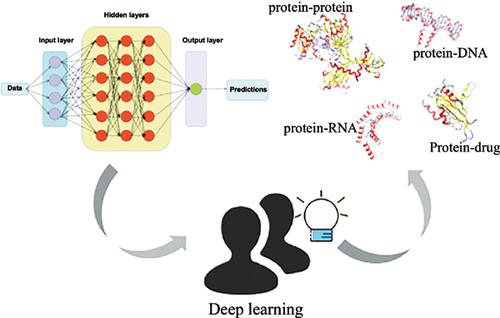Protein & Peptide Letters ( IF 1.0 ) Pub Date : 2020-05-01 , DOI: 10.2174/0929866526666190723114142 Cheng Shi 1 , Jiaxing Chen 1 , Xinyue Kang 1 , Guiling Zhao 1 , Xingzhen Lao 1 , Heng Zheng 1

|
Protein-related interaction prediction is critical to understanding life processes, biological functions, and mechanisms of drug action. Experimental methods used to determine proteinrelated interactions have always been costly and inefficient. In recent years, advances in biological and medical technology have provided us with explosive biological and physiological data, and deep learning-based algorithms have shown great promise in extracting features and learning patterns from complex data. At present, deep learning in protein research has emerged. In this review, we provide an introductory overview of the deep neural network theory and its unique properties. Mainly focused on the application of this technology in protein-related interactions prediction over the past five years, including protein-protein interactions prediction, protein-RNA\DNA, Protein– drug interactions prediction, and others. Finally, we discuss some of the challenges that deep learning currently faces.
中文翻译:

蛋白质相关相互作用研究中的深度学习。
蛋白质相关的相互作用预测对于理解生命过程,生物学功能和药物作用机制至关重要。用于确定蛋白质相关相互作用的实验方法始终昂贵且效率低下。近年来,生物和医学技术的进步为我们提供了爆炸性的生物和生理数据,基于深度学习的算法在从复杂数据中提取特征和学习模式方面显示出了巨大的希望。目前,已经出现了蛋白质研究中的深度学习。在这篇综述中,我们提供了有关深度神经网络理论及其独特属性的介绍性概述。在过去五年中,该技术主要用于蛋白质相关的相互作用预测,包括蛋白质-蛋白质相互作用预测,蛋白质-RNA \ DNA,蛋白质-药物相互作用预测等。最后,我们讨论了深度学习当前面临的一些挑战。











































 京公网安备 11010802027423号
京公网安备 11010802027423号